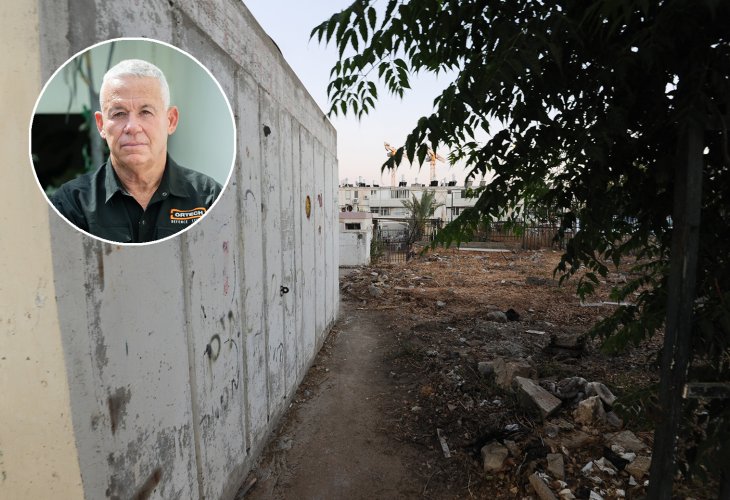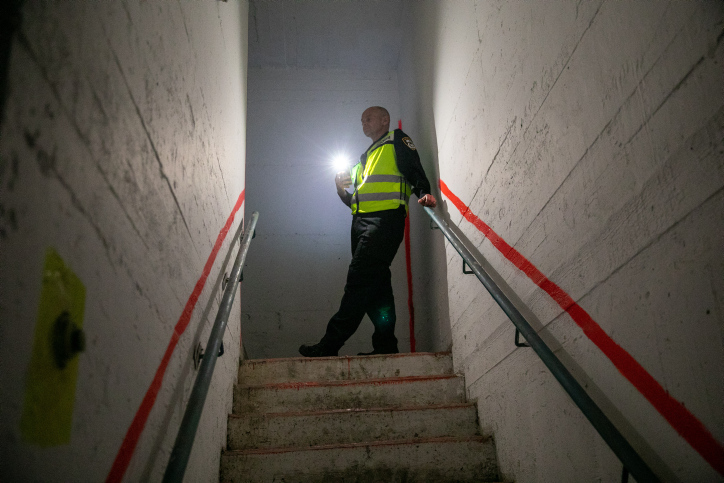"This is a Life-Threatening Situation, People are Unaware that Their Safe Rooms Are Defective"
For years, Ran Naor has been highlighting the crucial need for safe rooms throughout the country. Now, amidst frequent alarms and living in Kibbutz Carmia near the Gaza Strip, he is convinced: "People must wake up. It's inconceivable that any home in Israel lacks a protected room."
 In the circle: Ran Naor (Background photo: Avi Rokach / Flash 90)
In the circle: Ran Naor (Background photo: Avi Rokach / Flash 90)"I am troubled and concerned," Ran Naor tells us this week, discussing the dire situation that our small nation has found itself in. He speaks from his role as CEO and owner of 'Ortech Protective Systems', which deals with building protection, anti-missile fixtures, car bombs, and suicide bombers, as well as his perspective as a resident of Kibbutz Carmia near the Gaza Strip. He closely observes the severe developments at the border, being among the first to learn of the harsh numbers and horror stories. He also knows that many families in Israel will find themselves unprotected during an alarm, as they lack a functional safe room at home.
Shabbat of Hysteria
What happened to you last Shabbat? Where were you when the attack caught you?
"I was at home, during a routine Shabbat. Even when the Red Alert alarms began, we didn't panic; we're used to this as it's part of our routine. We know how an attack begins and can escalate rapidly, from zero to a hundred, without knowing if it will end with two or three launches or 300. That's what our lives are like. But this time, I quickly realized it wasn't just a regular missile firing. Alongside the firing of Qassams, we also heard very intense small-arms fire, with both sounds being almost simultaneous and blended together. I understood immediately this signified a particular operation, though I couldn't yet grasp its magnitude. However, it was clear to me that it was a different course of action."
What do you do in such a situation?
"Since I am part of the kibbutz's emergency response team, updates were quickly shared in our group, and we divided into sectors, with everyone in the settlement taking their position, waiting for developments and updates. At that point, we didn't know what had happened; we just heard deafening gunfire and endless falls. We prepared ourselves for anything and were well-practiced thanks to past experiences. Meanwhile, we started understanding through WhatsApp messages and phone calls that something was happening here that was still unclear. But the only thing that was clear was that it could reach us at any moment and on a scale we hadn't known. We began receiving horrifying reports from Kfar Aza, which had not yet reached the media; we knew these weren't mere rumors, but a terrible massacre on the residents was happening, realizing our worst nightmare as residents of the border region. Meanwhile, there were quite a few falls within our settlement area, thank Hashem, without casualties, and families began evacuating voluntarily under fire, understanding that it was impossible to predict what the next hours would look like or if evacuation would be feasible. Some families couldn't evacuate, as the men were part of the standby squad and couldn't leave their positions. Only late at night, when IDF forces arrived to replace us, could they join their families, who spent the whole day under siege in the safe room and escape from the kibbutz."
Did you stay in the kibbutz?
"Yes, it was evident to me that I was staying. I am needed here, and I take responsibility for everything I can. I try to keep myself safe, but I am ready to help when necessary, and unfortunately, the need is very great."
 (Photo: Yossi Aloni / Flash 90)
(Photo: Yossi Aloni / Flash 90)
Without Protection, Without Defense
When Naor talks about the issue of protection, it is clear he is agitated. "Today, a safe room is definitely an effective solution," he says. "Although it may be that following the severe events, there will be a need for improvements or upgrades, it is clear that for now, it's the most effective protection available. I can't say for sure if every resident in the south has an accessible safe room at home, but I can point out what is very evident to me and which I think is now clear to every citizen in Israel – it's inconceivable for anyone in our country, from Dan to Be'er Sheva, to live in a home without a safe room, especially since today there is the possibility of fortifying rooms to a very high degree, even in buildings constructed before 1992, when there was no law requiring a safe room in each apartment. This protection reaches the level of 97% of the standard safe room, and it is indeed the best solution."
Naor notes that, according to government data, 700 thousand households in Israel do not have a protected room at home. "These figures are based on family reports, but unfortunately, I know the numbers are much higher," he adds. "These are families spread across all of Israel, some in very sensitive areas. But as we know today, the entire country is at risk, and there's no area where protection isn't needed."
Do you know who these people are that allow themselves to take this risk?
"The terminology is not correct," he remarks. "Because one should not ask 'who these people are,' but rather who are the leaders allowing such a situation to occur. I completely understand the ordinary citizen who doesn't have 100 thousand shekels for room protection and needs that money to buy food and bring it home. But I don't understand the Prime Ministers, Members of Knesset, and ministers who have not yet led an initiative in Israel to help promote the citizens' motivation in one way or another, to enable them to take on the protective action so desperately needed."
Do you expect the state to bear these high costs?
"No, but there are many other ways it can help. For example, it can announce that anyone who arranges to protect their home in the next two years is not required to pay VAT. This is already a significant 17% discount, and I am sure it will motivate many people. There can also be other ideas along these lines; I tried to propose them in the past, but no one listened to me.
"Even more so, there are also budgets that the government has already allocated for protecting residents' homes, such as 350 million shekels meant for fortifying rooms for Ashkelon residents, but about two months ago the budget was halted. Now we see the bitter results. There was also a very large budget for fortifying buildings in the north, but it was also stopped. It's very difficult to talk about this because the data is painful, but it's clear that many people are paying for these failures with their lives."
If there is a demand, are you prepared to protect so many homes in a short time?
"The answer is definitely positive. For us, it is not a problem to protect the homes of hundreds of families or even more in one month. The issue is not operational; it's that there's no one to lead this initiative and take it forward."
There is also another fact that bothers Ran and particularly concerns him these days. "We are encountering a phenomenon these days of thousands of families who have a safe room but it isn't functional, because they dismantled the door on their initiative as it didn't look suitable to them, or the window broke and they didn't bother to fix it, and so on. Now those families are contacting us in hysteria, asking us to send teams to fix their safe rooms. It's not easy to take care of everyone, because most of our professionals are in the reserves, and even when they arrive sometimes they see situations where repair is almost impossible, like rusty hinges, broken windows, and other things that have been damaged. These repairs involve high costs, and not every family is able to bear them."
Nevertheless, Naor is sure that this is the only way, and every significant effort must be made for it. "In these days, we all see that the movement happening here is not natural, but one thing is clear – it is incumbent upon all of us to make an effort to help ourselves and our family members. I don't want to think about what might happen if we don't take responsibility for this matter and ensure that as many families as possible have protected and compliant rooms in their homes, for any emergency that may arise."

